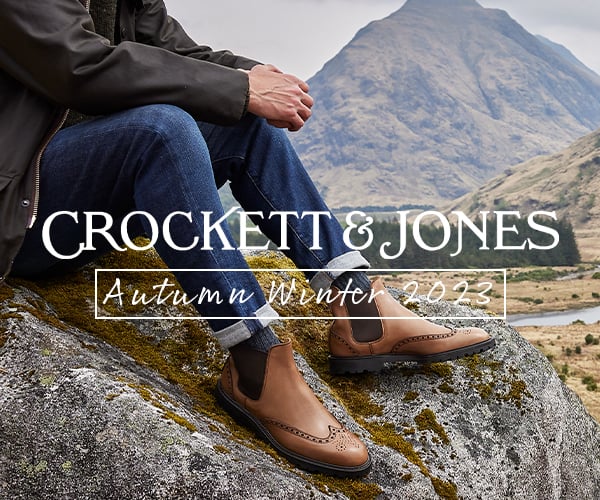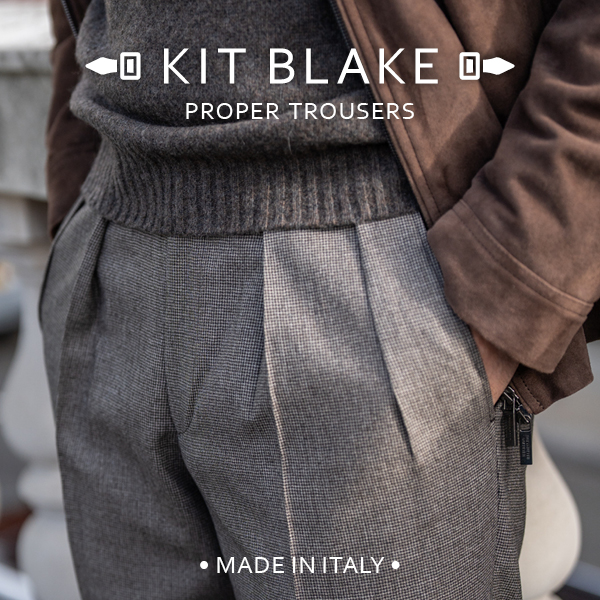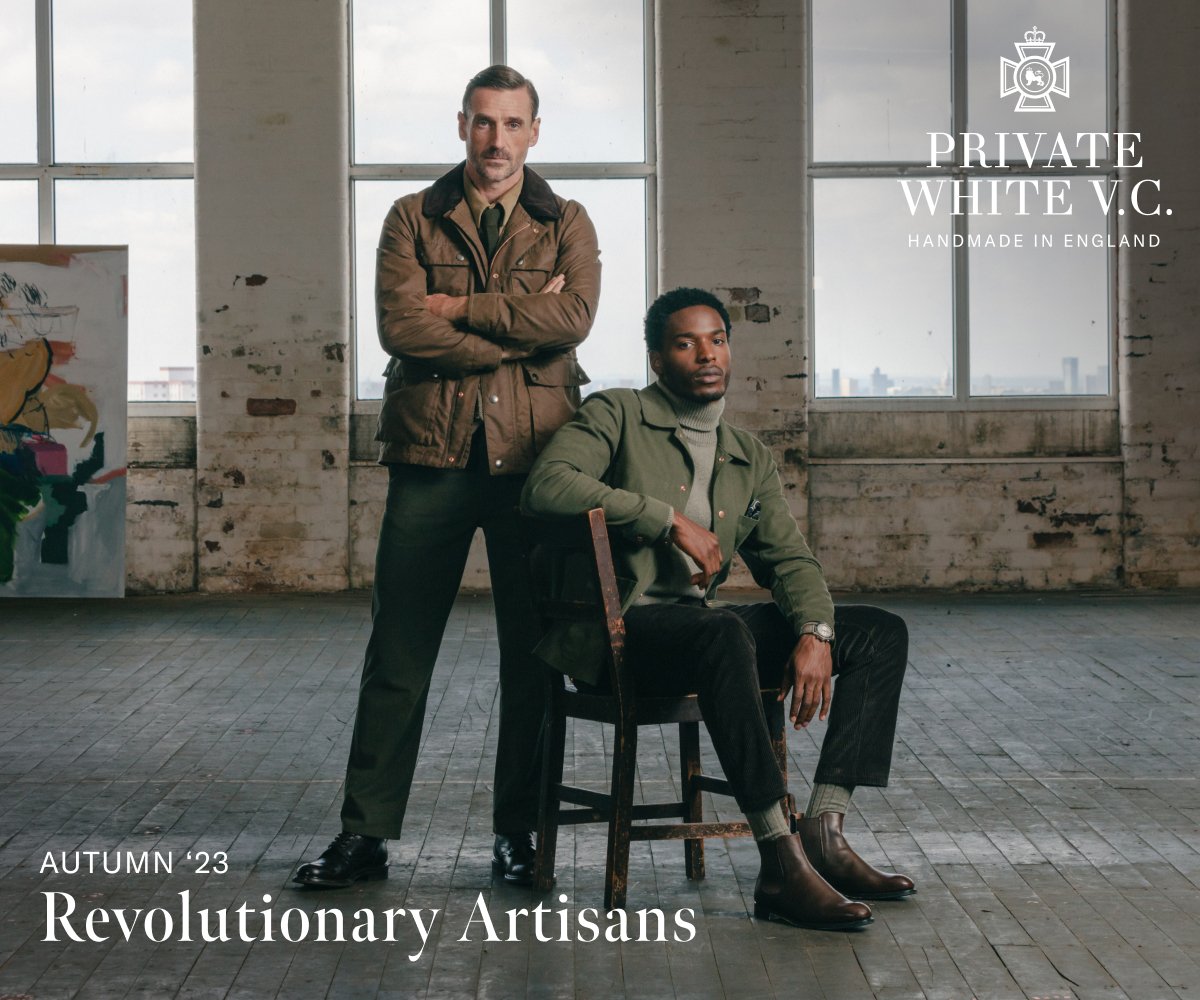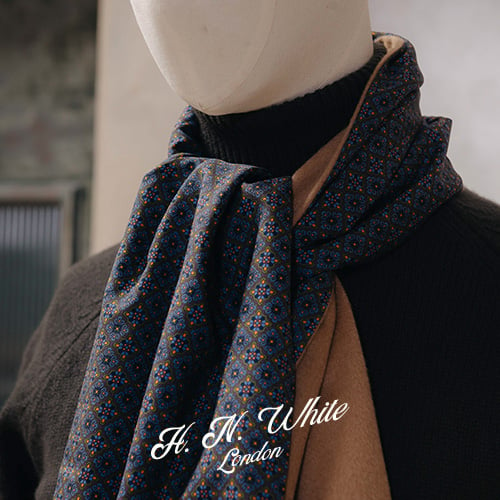Working from home has thrown up lots of interesting clothing debates recently - including whether people will just stop caring, as we discussed recently.
Another interesting one, I think, is the idea of comfort. As in, ‘It’s just so comfortable wearing a T-shirt and sweatpants all day - I can’t see myself wearing anything else again.’
I’d like to unpack this idea a little, as it contains a lot of interesting assumptions. And, I find that thinking about them helps us understand the particular things we enjoy, or don’t enjoy, about clothing.
So, what is comfort?
A lot of people would answer that it's softness, particularly in something like a T-shirt or sweatpants. When I asked my 12-year-old daughter how she would define comfort, her response was ‘fluffiness, and nothing itchy’.
And yet, soft things are not necessarily comfortable. A fleece onesie might be even softer than your sweatpants, but that doesn’t mean you’d wear it - both because you’d feel silly, and because the thick, synthetic fleece might feel uncomfortable over time.
Even staying with natural materials, not everyone likes the super-soft feel of fur.
Another answer is looseness - a lack of restriction. Free-flowing linen trousers in the Summer, perhaps, that you barely feel you’re wearing.
But that doesn’t necessarily work comprehensively either. Would you really want to walk down the street feeling like you’re wearing nothing at all? Basically naked, but warm and dry?
Part of the pleasure of those loose linen trousers is the occasional feel of the material - the cool, smooth cloth brushing over the skin.
The same goes for the comfort of being in bed. We recently got a new duvet that is also lighter, and it feels very odd. There is a particular comfort in a heavy blanket - indeed you can buy weighted blankets that are supposed to help children sleep better.
Separately, freedom of movement often comes not from lack of any restriction, but from restriction in the right places. As in the small armhole on a bespoke jacket, or close-fitting gloves.
Shoes have to grip you, as well as letting you move. If those linen trousers were loose and falling down, they might be irritating and less comfortable.
There are some men that seem to like trousers that are loose and falling down. But I wonder if style were taken out of the equation, whether a waistband that fitted more closely would prove to be preferred.
At the very least, this shows another way - personal experience - in which the concept of comfort is subjective.
One more answer is that comfort is about material that moves with you - that is moulded and lived-in.
This crystallises around the question of whether jeans are comfortable.
We’ve had comments in the past where readers have asked how anyone can find jeans comfortable - because they’re so tough, so stiff. Tailoring cloths are often held up as superior, because of their looseness, softness, drape.
We’ve already touched on looseness and softness: good fit is part of that comfort too, and some feel of the cloth.
But what’s really at stake here is that jeans mould to you, and feel reassuring as a result. You push against the denim, and so feel more of it. There is pleasure in the closeness of the fit - you feel the cotton more, and the way it warms to your body.
Other cottons, such as loopwheeled sweats, are similar. The pleasure there is not really the softness, but the pliability - the stretch and movement, which comes from the density of the knit.
Another example is a horsehide leather jacket, which moulds. It is one of the most restrictive things you can wear, given it’s so close-fitting and tough. But you can still understand someone who says it’s comfortable, because of that reassuring, form-fitting feel.
And of course there’s tailoring, which can be comfortable through fitting in all the right places (close on the neck, in the armhole; loose in the back and the chest; shaped but never tight in the waist).
Finally, much of what we consider comfortable is psychological.
For example, on the one hand, comfort can come through contrast. I wore a shirt and tie the other day for the first time in a month, and there was real pleasure in the feeling of a close - but not restrictive - fit. It just feels like what a shirt is designed for.
But it felt great to wear a T-shirt and shawl-collar sweater the next day. I appreciated it because of the contrast. Same goes for wearing trainers after a couple of days in welted shoes.
Yet another example almost implies the opposite: comfort can come from habit, from the reassuring and familiar.
Old slippers can be the most comfortable thing, even if they're not the softest or best fitting. It's revealing, I think, that we'd call them comforting, as well as comfortable.
The idea of comfort is personal, complex, and psychological.
So it's silly to ask how anyone can find jeans comfortable, or how anyone can wear a suit and tie rather than a T-shirt and trainers.
It's what we like, what we're used to, and what we appreciate more.
For me personally, a lot of the feeling of comfort comes from appreciating materials. But I know it’s subjective, because those materials also vary: each has its own pleasure - there are different things to enjoy in wool, in fur, and in cotton.
Perhaps the saddest thing about wearing just a T-shirt and sweatpants all day, is that you only get to appreciate one of them.




































Another vital element of the psychological dimension of Comfort is propriety. Clothing is inherently social, and how you are dressed always communicates something to those around you about how you feel about the venue/event/activity you are sharing with them. There is, in my experience at least, great psychological comfort to be taken from sending a message of respect and admiration, and immense distress to be taken from feeling that you are inadvertently communicating the opposite.
Nicely put
Hi Simon, your outfit in the fourth picture from the bottom (jeans, jacket and chukkas) looks great. Which jacket is this? Also, are the boots snuff?
The jacket is from Elia Caliendo – in the Permanent Style Tweed we did years ago.
The boots are the Shanklin from Edward Green
The jacket looks great with the jeans.
Would you consider doing another run of the tweed?
We’ve tried. Breanish agreed, then delayed, then dropped out of contact. We will develop something similar though
Look forward to it.
I’m not an expert in this field but I’m pretty sure I read somewhere that in order to maximise happiness humans need irritants, i.e. you cannot be truly comfortable of you do not have something that is slightly restricting your comfort. I personally felt this during lockdown when, after some weeks, tracksuit bottoms became ‘uncomfortable’ and I became more relaxed in slightly less ‘comfortable’ jeans, chinos etc.
Interesting point about your daughter mentioning sctrachiness, sometimes I feel more comfortable in tweed or shetland knitwear because that’s what my mind associates with being at home/ not working than in softer materials such as cashmere, which I mainly wear when I’m out and about.
I’d say that for most people (perhaps not so much for PS readers, though) the idea of comfort is also tied to effortlessness. If you just wear sweatpants or sportswear all the time, you don’t need to iron them, care so much when they get dirty, etc. You just throw them on and are ready to go.
Also, most people just don’t appreciate the material or make enough to care for their clothes. Having to exercise minimal care increases the effort and, I think, reduces the perception of overall comfort – even if the item itself might be quite comfortable to wear.
And I agree with your point about it being psychological, which in turn is tied to popular perceptions around certain items of clothing. For many guys a suit or a jacket just cannot possibly be comfortable. Again, not so much for PS readers, I imagine, but for the general population.
Thanks Robert, and that first point is a really good one. There’s a real issue when it is just too time-consuming to think about what to wear, what to buy, and then how to look after it. The internet makes it easier, but nowhere near as easy as it being just how your family and friends dress, and treat clothes.
I agree with Robert M’s point about comfort being tied to not worrying about whether clothes get dirty. Suit pants feel more comfortable than jeans, but I’m more psychologically comfortable wearing jeans while working in the yard (of course). Different tools for different jobs, I suppose.
You are quite right about the comforting aspect of weight on the body, enclosure and a fit conforming largely to the body shape. These mimic a physical embrace and cause us to feel relaxed and cared for. Not just humans but other animals too respond to this on a basic psychological level. For instance there has been considerable research into the calming effects experienced by cattle when gently squeezed between movable restraining barriers (see Temple Grandin) . In a nutshell its the HUG that comforts us!
Thanks Simon.
Quick Q – have you come across Speciale on Portobello? Good quality Florentine inspired bespoke, and perhaps more interestingly some really good quality design led knitwear etc. Would be curious if you have heard of them / plan to visit
Wow, no I haven’t and looks really interesting. Thanks for the tip
No worries!
If we’re talking about comfort in this lockdown period, I really like the parallel you made with the word “comforting”.
To me, as I need to be at least a little dressed up to be able to work (psychologically, I wouldn’t be able to focus while wearing trackpants and a t-shirt) this means shawl collar cardigans, heavy rollnecks (think Inis Meian), jogpants / leisure pants with an elasticated back but a formal front, thick wool or cashemere socks and often Sagan loafers by B&L.
My regular shirts and jackets are comfortable, but I wouldn’t say they’re “comforting”, which is what I need now. ^_^
Comfort is ‘what you’re comfortable in’ and that is occasion dependent and self-image dependent. We’re all old enough, I would suppose, not to buy something that is physically uncomfortable. I grew up in jeans for leisure time and Suits for work and, for a long time, found it uncomfortable to do other; as the expectation in almost every situation became more casual, I found that the foundation (of personal style) I had built for myself around that basic idea provided the pivot for change. I still don’t buy anything uncomfortable.
If only comfort could be well fitted and tailored.
Is it possible for it to be….
an open neck,
soft shoulder,
more open armhole,
unrestrictive chest and waist (on jacket and shirt/ top ),
drawstring waistband (on trouser).
All of the above in a stretch cloth.
I think this is a good example of different ideas of comfort: I find drawstring waists much less comfortable than a normal band on a well-tailored trouser. It holds better and is shaped to me.
Same on stretch cloths. I find them less comfortable, because while they allow you to reach, they also pull at you as you do so. You’re constantly being pulled by the cloth, whenever you move. Much better a slightly roomy cut that remains elegant
I feel this subject is also on a tangent to what some would call “suffering for one’s self-expression”. A person’s desire to appear a certain way or project a certain image can sometimes make them cross boundaries that exist in order to protect the body from universal forms of discomfort, particularly the ones that are involuntary reactions to stimuli such as restricting fit and climate-inappropriate materials.
I am entering week 3 of recovery from knee surgery. I have been mostly confined to a chair and wearing sweatpants as they are loose enough to accommodate the dressing and bulky tensor bandage.
I am tired of wearing sweatpants and really look forward to wearing some well fitting wool pants again.
Sweatpants are loose and easy to put on but they don’t give me pleasure the way my tailored clothes do.
I’m sorry to hear that Peter – both your injury and your pining for tailoring. Get well soon.
Surely one needs both physical and sartorial comfort to achieve total comfort ?
The physical is achieved through fit and choice of material. The sartorial thru’ taste.
The former is not so complicated. The latter remains elusive for the great unwashed.
The true definition of a snob is one who craves for what separates men rather than for what unites them.
Interesting definition. I assume there’s nothing wrong with craving for things (eg some forms of the arts, low or high) that happen to separate people, rather than because they do?
I personally don’t see anything wrong with liking something for it’s own sake, but then it’s not snobbery.
I’ve never heard anyone make snobbery sound so good!
Strangely enough I find C & M’s very structured jackets some of the most comfortable I own. The slight pressure on both sides of the waist feels like a soft hug. The shoulders and arms of Mr. Morgan’s jackets give me more movement than any other jacket I own. When wearing a softer jacket e.g. without hourglass shape I miss the hug 🙂
I wonder to what extent men have the luxury of greater choice than women. I think most of us will have dated girls who turned up with shoes which they adored the style of but which were killing their feet. It must be uncomfortable at times also to wear (or not wear) a bra or corset (our equivalent is the support – or lack of it – from our underpants).
Comfortable clothing to my mind divides into three categories: 1. clothing predominantly required by the need to cover, protect or support parts of the body; 2. clothing which does not feel easy against the body and is consciously felt by the wearer all the time it is worn but which is tolerated or welcomed because it enhances the self-esteem of the wearer, such as the aforesaid high heels on women, or white tie and tails (uncomfortable but looks fantastic unless you’re Donald Trump at a Royal state reception) or formal military uniforms and 3. clothing which is easy to care for, malleable and temperature appropriate. The vast majority of clothes you review, Simon, fall into this last category and have greater or lesser attraction to the wearer depending on the factors you allude to. My autistic son always tends to do up the top button of his shirts as that helps his anxiety. I learned after many years not to remind him to leave his collar open. Clothes and what people enjoy wearing, and the different ways in which they wear the same garment are perhaps the greatest expression of the diversity of human beings, bar their own human forms themselves plus the genius of the human mind.
The Shanklins look really cool. Do you find them useful in your wardrobe? Is this the mushroom suede they sell on their website?
Yes it is. To be honest, I love them but I haven’t found the colour that useful. Nice with jeans and with cream maybe, but not that much else. Dark brown or even snuff/tobacco would have been more useful
I find this an interesting discussion. Adding to the discussion of comfort, I’d just add to the “use” is important. For example, as I work from home I often find my self on my couch, barefoot with my legs slightly folded and my feet on the couch. Something one is quite at ease doing in a nice pair of joggers, or perhaps some (casual aka non-creased) chinos.
But I suppose that’s part of the psychological part isn’t it? I can just as easily wear my flannel trousers or worsted wool trousers and do the same, and be just as comfortable physically. However, when I do put on proper trousers I’m more likely to sit at my desk for fear of ruining the clothes I’ve invested so much in (both monetarily and emotionally).
To add a bit more here, in a non-COVID world, besides most nature related activities, most of what I would do in jeans I’d do in trousers (like actually running to the bus stop, home tasks, etc.)…cementing to me that the only barrier in “comfort” is a psychological one (and dependent on environment).
Maybe I will try wearing one of my flannel trousers as I would my joggers around the house (during the day). Thanks for the article and the discussion on the meaning of “comfort.”
Nice article. Part of what comfort provides is solace and strength. I think that’s why it’s not just about softness and ease – what we draw solace and strength from can be harder and more structured
Part of psychological comfort, for me, is in knowing that I am presenting myself in the way that I wish to be seen. I realise that this is a self-conscious take on it, but I doubt if any of us are completely free of this concern.
One could also say the opposite, that total lack of self-consciousness concerning what one is wearing is the ultimate in being comfortable.
Great attempt (and comments) at pinning down the elusive meaning of comfort.
Overcoats can feel similarly to blankets: a nice, heavy garment that wraps around keeping you warm and cosy. Yet I have friends that are astonished at the weight of an overcoat and wondered how it could possibly be comfortable. Some wear those down-like light synthetic jackets that for me feel disposable, shiny and hardly cosy.
Some very good points. Comfort is so much about how you feel. I spent quite a while just wearing jeans and a t shirt now I’m working from home, but as it has gone on I mix it up to make myself feel better. Flannels and a North Sea Clothing shawl neck knit today, and a pair of Edward Greens when I go out later, even though I’m just going to the post office.
Comfort,for me,comes from stress free. I was extremely comfortable in my RAF uniform, less so in a brand new pair of good quality loafers. There is definitely a degree of relaxed comfort in quality, the thing Scandinavians define so well.
I think the great thing bespoke gives is the ‘on switch’ it gives you with peers and friends.I love my sweatshirts and jeans, I love my bespoke jackets and good shoes, familiarity ,warmth, great self image…All comforting to anyone.
Great article Simon. It brings clearly into focus the many aspects of comfort that are often only half-conscious. Greater consciousness of these things gives us a more rounded and differentiated judgment when it comes to our choice of clothes, as well as increasing our enjoyment of them.
I had never previously given much thought to how we define comfort. I think from the article and comments it is obviously subjective .
For my ‘tuppence worth’: There is an emotional comfort to which some comments have alluded.
During the latter days of my full time career when I was more senior I felt various types of comfort.
A day in the office (remember them!) or away with my team I felt quite comfortable in a sweater (a shawl collar cardigan on colder days) and flannels or cords. Sometimes jeans. Comfortable shoe wear as well. I felt physically and emotionally comfortable for working with the team dressed in this way.
When I attended as a member of a senior executive team or dealing with something more formal with my team, I would wear a suit or formal jacket and trousers, sometimes tie. I felt not only more comfortable in myself this also extended to being comfortable in respecting the rest of the Executive (there was no peer pressure as everyone dressed in different ways). Similarly when meeting with the CEO, I would go full suit, shirt and tie, through this I was respecting her and her office, thus feeling more comfortable doing so.
I think this emotional feeling of comfort is important.
Currently wearing a pair of comfortable freshly was jeans, to face the day!
Stay safe everyone.
It’s funny you should post this now. I had a moment last Saturday night during my usual routine involving dishes. Typically, I would change out of my dress pants and button down into a t-shirt, sweater and more flexible pants or jeans. I found I didn’t want to, because I was genuinely enjoying the comfort of the button down. I think this article goes a long way toward explaining that impulse.
I think comfort in today’s world is overrated. Clothes do not have to be comfortable for the ultimate purpose, quality, aesthetics, the well-doing in their manufacture, values that matter more than comfort, much earlier. I think comfort is an ambiguous concept. It is effort, beauty, harmony are the most valuable sensations at any time, and it is what makes us more civilized, cultured …
Interesting article.
As a cognitive psychologist and neuroscientist who studies human attention, I think that an essential aspect of comfort is being oblivious about the clothes you are wearing. If your attention is drawn constantly to what you are wearing, then that isn’t really very comfortable, is it? You want comfortable clothes that you can put on and forget about because they are so easy to move around in, and they work well with whatever task you are doing. In short, your attention can be devoted to other matters of more immediate import.
A related aspect is sensory adaptation. Steady-state stimulation is something that we don’t pay attention to. At the onset and offset of a light source, for example, certain neurons in the visual system fire more rapidly, but in between, when the light is constant, the neurons subside to a resting level. Likewise, the feel of clothes on your body or skin is something we don’t want to be constantly attending to, and typically we don’t. When we put those clothes on, or take them off, our attention may be drawn to their fit, or texture or feel, but in between, we want to be oblivious to them. This is one reason why ill-fitting clothes or shoes are so problematic. They keep capturing our attention. We can’t forget about them!
Thanks, that puts into more precise language many of these points.
I’d be interested how much lovers of good clothes do want to notice them or not – you don’t want to notice them because they’re uncomfortable, or because they need regular adjustment, but the feel of them on the body is a part of the pleasure of wearing them, at the same time.
This has been a superb conversation. I get the part about being oblivious to your clothing once it’s on, but–to your point, Simon–if I’m wearing a luxurious piece, such as a cashmere sweater, I want to be conscious of it from time to time throughout the day. That, to me, is the purpose of wearing it.
Simon, an excellent and thoughtful article on comfort. I had a similar thought a few short years ago ago about shoes. An employee asked me if my all leather boots were not uncomfortable? He was wearing sneakers and I said I thought my shoes were far more comfortable. He claimed it was impossible as he shoes were definitely softer. I agreed but on reflection realised that comfort and softness were indeed different things.
The gloves you’re wearing in the, 4th picture look incredibly comfortable where we’re they from, as I’d love a pair myself.
They’re from Merola – see post on the company here. They’re pretty standard for high-end gloves in carpincho leather though
Being a bit more cynical, there is, I think, an inflation in the use of the concept of “comfort” as a way to justify certain personal choices. I would imagine it’s not as apparent in the UK as in other places, but the role of Authenticity plays some part in it. A few years back, when people started wearing sweatpants and sweatshirts everywhere they went, they justified it by stating they’re comfortable, as if saying “this is the authentic me”. Hence, the concept of comfort was narrowed down to one aspect of it, context was removed and most other uses of comfort as reasoning for wearing a garment were deemed unauthentic (try wearing a jacket to a non-jacket wearing part in a casual dressed society, and see no one believes you when you say it’s comfortable).
Indeed the simple concept of “comfort” is far more complex that it seems. For most of us, comfort is also what we project. If you wear something that feels right, you’re aware that this is the right version of yourself, valued because of how it projects that “you” into the society/community. This is comfortable in the psyche, in addition to comfortable as a physical and sensory notion.
Nice piece of writing.
Simon a fantastic post. Thank you. I always enjoy these more philosophical posts, they make me stop and think about something from a fresh perspective. It is the sort of discussion you have in the pub but only with very particular friends and probably a discussion that most other people would find totally bizarre. These are one of the reasons Permanent Style is such a special site. I would add some comments on cycling clothing where I think many of these elements are felt to extremes, but I expect that would be a niche of a niche on the subject!
Lovely to hear Rob, and do feel free to add your thoughts on any related topic like that. I for one always find them interesting – as I have with all the detailed comments above as well
Interesting post. Thank you. Comfort me involves many things. In addition to what you mention, it includes clothes where I feel like myself. Ideally, the best version of myself. I’m 50 so I would feel like a tool trying to emulate the fashions of a 20 year old. Be yourself! Buy the best you can afford. Buy what suits you (pun intended).
On that note, suits are the most comfortable clothing (in all the meanings of that term) that I have. I hate that they are going out of style (though I still wear them).
Finally, on jeans: Paige jeans are the only ones I have ever bought that I would call truly comfortable
For me, since I got into bespoke and MTM. the one area where find can be an issue in terms of comfort is trousers waist. It seems that this part of my body can vary tremendously from one day to the next depending on what I eat. So what I have done is start ordering my casual trousers with a lower rise (on the natural hip) and slightly larger waist measurement. For suit trousers I have a higher rise and always use suspenders to keep em up there. This works. However, I am yet to figure out how to make up a casual suit, as I dont want to wear the suspenders then, but rather have them like my casual trousers, without getting that gap between the jacket, trouser and shirt. Any thoughts on this Simon?
I don’t think there’s a solution to that I’m afraid man. You probably have to pick one or the other
Yes, that was what I was thinking. Oh, well part of the sartorial journey is figuring these things out right 🙂
Until recently, I didn’t even own sweatpants, but I was gifted a pair as a joke by some friends as my son was born. I don’t wear them much really, I actually find them uncomfortable. They’re warm in bad way, just make you sweat, they’re shapeless and have useless pockets.
My default whenever I’m home to be a slightly heavier long sleeved t-shirt and either old tailored linen trousers (faded and patched up so not fit for regular wear anymore) or a pair of jeans. As the temperature gets lower a few chunky shawl cardigans come into rotation. It’s comfortable, looks fairly presentable and feels good to wear.
Also, If you have them, I can’t really think of anything more comfortable to wear than some heavy flannel trousers, cut with some volume.
To some extent I’m surprised there isn’t a bigger market for nice lounge/home wear for men. Looking at the women side, there are so many offerings, lux cashmere sets that looks nice too. I know there are similar sets for men, but they all seems to have the same issue as regular sweatpants: they’re baggy, have ribbed cuffs at the feet which makes the bagginess even worse, and they’re often paired with a poorly designed hoodie.
Simon, an unrelated question: whise socks do you normally use and how long do they last normally? How often do you buy them? What is a normal lifespan of a pair of socks?
It depends a lot on how many you have, and whether you normally wear fine cotton dress socks, or more substantial casual cottons, or wools.
But I buy mine from Anderson & Sheppard or Mes Chaussettes Rouges, and the fine cotton ones probably last about two years? I’ve never measured it though so it’s a bit of a guess
Another interesting and thought provoking article Simon, thank you. Some interesting and thought provoking responses too.
I would agree that fit is a vital element to comfort. If a piece of clothing is ‘cutting in’ somewhere, say around the waist or cuff, or doesn’t seem to hang right on you, it is uncomfortable.
Can I suggest a couple of other elements for consideration: Colour and ‘fitting in’.
I personally would feel uncomfortable in garish colours, or indeed colours that don’t flatter my skin tone. I also feel a lot of men like to ‘fit in’, either in their workplace or circle of friends. I have had some very interesting discussions with both men and women (talking about their male partners) around the issue of ‘fitting in’. An example being a female acquaintance was trying to encourage her boyfriend to ditch his rucksack and buy a stylish bag, but he resisted as ‘everybody else in work has one’.
Nice point Alec. I think that’s an extension of the point above about propriety – elegance is about putting others at their ease, and by extension yourself at ease too
Only time I wore gloves. In -20 fare height Pennsylvania 1970s winter mornings in 2 feet of snow cleaning the car . Always made it to work.
Simon,
Do you have any posts about what you wear at home when you are not working or doing casual things like running to the store? I found one about what you wore from home working during the pandemic, but I could not find anything about what you wear when you are “off-duty” and hanging around, maybe playing with the kids, something like that. If you have can you please direct me to it? If not it maybe wouldn’t be a bad idea.
I find that I generally dress either above (worsted business suit for work) or below (t-shirt or sweatshirt and then french terry shorts or pants) what you wear regularly. When I get home from work getting out of business suit is one of the first things I do then I generally put on what I call lounge clothes. I may dress up a bit more if I’m running to the store or going to kids sporting events, but even then I’m still generally below the formality level on this website. I was just interested what you wear in those type of situations.
Thanks.
Have you seen this post on the weekend wardrobe? Is that the kind of thing you meant?
It’s usually an elevated version of what you describe – so a sweatshirt, but a heavy McCoy’s one in a shorter cut; chinos, but really worn in quality ones; chunky white socks from AnonymousIsm I love. Then boots over those, but Viberg or Edward Green.
To be honest I’d wear that going to the store as well as round the house – I wouldn’t dress down from that, if that makes sense.
Simon,
No I had not seen that post yet and yes that is the kind of thing I meant, although I do wear a lot of less formal things than are mentioned in that post. Some of the items, like suede chukka boots, jeans or chinos, oxford and a sweater (with jacket if needed) are things I have and wear regularly if I’m going out for dinner or to a party that isn’t overly formal. The cotton sweater, jeans and trainers is a common look for me for running to the store in cooler weather.
And yes it makes sense that you wouldn’t dress down from that. Do you think that is because of your preference for classic menswear, or something else? I also wonder, if because I live in a much warmer climate, living in Dallas, TX, that that has some effect on me dressing at lower levels of formality. I assume it does at least somewhat because I have more occasions and reasons to wear shorts and short sleeve shirts because the weather demands it. And I suppose in general, people is warmer climates wear less formal things regularly. While most business suits are still navy or grey here, you do see lots of tan, lighter greys, and even seersucker is acceptable as a suit cloth for many business occasions.
I think the fact I like classic menswear has some influence, but more of it is just the fact I enjoy good clothes – and no matter what I’m doing, I want to wear clothes I really enjoy and appreciate the quality of.
You can easily replace those quality, workwear chinos with the same in shorts. Wear light chambray shirt with them, and you’ll be really cool, yet more dressed up than a T-shirt and sweatpants, for example.
Does that make sense?
Hi Simon. Just now my charcoal fleece from Universal Works is comfort. I stopped by their lovely Coal Drops Yard store a couple of weeks ago and again today, Smashing service and a lovely atmosphere. Some really thoughtfully designed clothes.
Daniel